History
By mid-19th century beer-making in the Kingdom of Poland was neglected due to high excise taxes imposed by the Russian authorities. However, new technologies were being introduced and the industry was seen as a possible source of profit. In 1846 two Warsaw beer makers, Błażej Haberbusch and Konstanty Schiele created a company with their common father-in-law Henryk Klawe. The new Haberbusch, Schiele i Klawe partnership soon bought a bankrupt Schöffer i Glimpf brewery in central Warsaw from the Polish Bank. With Klawe's money the Haberbusch and Schiele managed to put the business back on track and in 1850 they acquired yet another brewery from a Mr. Czarnecki. The two companies were merged.
In 1865 the elderly Klawe withdrew from the firm and since then the company was known by only two surnames. About that time the Haberbusch and Schiele duo started to promote their beer. Among their original ideas was acquisition or rental of several beer gardens in various parts of the city, where the beer was served and music bands invited. They also extended their product line following the construction of a dry ice factory. Also, in 1880s the firm opened up a beer bottling factory in Kiev and started to export the beer to the Ukraine. In 1898 the firm was transformed into a joint stock company under the name of Joint Stock Society of the Steam Brewery and Dry Ice Factory "Haberbusch i Schiele".
Following the World War I and regaining of Polish independence, a new era began for the company. The period of post-war prosperity resulted in the Haberbusch i Schiele company becoming the largest Warsaw-based brewery out of several dozen firms. In 1921 the company merged with other top-five breweries (run by Edward Reych, Karol Machlejd, Seweryn Jung and the Korona brewery). The result of the merger was the creation of the United Breweries Joint-Stock Company "Haberbusch i Schiele", the largest brewery in Warsaw and one of the most influential in Poland. The position of the new company rose quickly and by 1924 it extended the range of production to coffee, vodka, liqueurs, lemonade and sauces.
During the World War II, following the occupation of Poland by the Nazis and the Soviets, the brewery continued its activities under a German management board. The production continued until the outbreak of the Warsaw Uprising. During the fights the granaries and depots of the company served as the granary of Warsaw, providing barley and sugar to the starving population of the besieged city. [1] The brewery complex at Ceglana street was held by the Home Army until the very end of the uprising. In the result of the heavy fights and the German actions after the uprising had ended, approximately 70% of the brewery's infrastructure had been destroyed. [2]
After the war the brewery was nationalized and partially rebuilt. In modern times the descendants of the Haberbusch and Schiele families are trying to reclaim their property from the modern Warka Brewery company, part of the Grupa Żywiec concern. [3] [4]
Kompania Piwowarska is a Polish brewing group based in Poznań, established in 1999. Since 2017 it has been owned by Asahi Breweries. Kompania Piwowarska currently has three breweries: Lech Browary Wielkopolski in Poznań, Tyskie Browary Książęce in Tychy and Browar Dojlidy in Białystok. Tyskie Browary Książęce, one of the oldest breweries in Europe, was founded in 1629.

Beer in Poland has been brewed for well over a thousand years and has a significant history of tradition and commercial beer production. Poland is Europe's third largest beer producer, producing 36.9 million hectolitres, coming after the United Kingdom with 49.5 million hl and neighboring Germany with 103 million hl.

Browary Lubelskie is a Polish brewery. Founded in 1844 in the abandoned ruins of a monastery, in 1846 it began brewing a Helles-style beer using bottom fermenting technology. A second brewery opened in 1914.

Royal Unibrew is a brewing and beverage company headquartered in Faxe, Denmark. Its brands include Ceres, Faxe, Albani, Thor, Karlens and Royal. Royal Unibrew also has a strong presence in the Baltic region, where it owns Vilniaus Tauras, Kalnapilis, and Lāčplēša Alus. As of 2018 it owns the brewery in France that produces the Lorina soft drink brand. It also brews and markets Heineken in Denmark.

Tauras is a Lithuanian brewery, established in Vilnius in 1860. Tauras was taken over by Royal Unibrew in 2001. It is a part of Kalnapilis-Tauras Group.
Dojlidy Brewery is a brewery located in Białystok, Poland, and owned by Kompania Piwowarska SA, the Polish subsidiary of Asahi Breweries. The brewery was modernized between 1997 and 1999, then in 2003 it was purchased by Kompania Piwowarska SA. The Dojlidy Brewery used to make many different brands of beer, after being bought by Kompania Piwowarska S.A. their main product is Żubr. Żubr is one of the most popular beers in Poland and is also on sale throughout Europe.

Stanisław Żaryn was an architect, urbanist, historian and academic teacher who significantly contributed to process of reconstruction of Polish historical architecture after its destruction by Germans during WW2. He was born in Warsaw to Eugenia and Franciszek Zaryn.
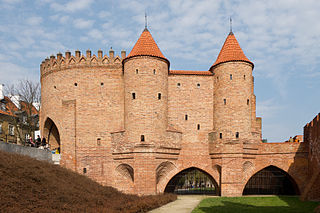
The Warsaw Barbican is a barbican in Warsaw, Poland, and one of few remaining relics of the complex network of historic fortifications that once encircled Warsaw. Located between the Old and New Towns, it is a major tourist attraction.

Okocim Brewery, in Brzesko in southeastern Poland, is a brewery founded in 1845.
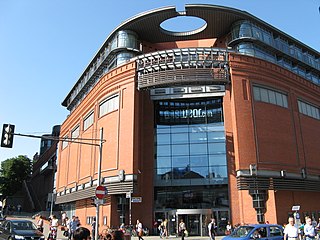
Shopping, Arts and Business Center "Stary Browar" - the center of commerce and art, built in November 2003, located in the center of Poznań, Poland at 42 Półwiejska Street. The center is a combination of retail space and an art gallery. The shopping center is adjacent to a Class A high-rise office complex. The total area of the center is around 130 000 m². The Old Brewery is home to around 210 stores and restaurants. The building was designed on the basis of a historic factory - the former Brewery Huggerów - by Studio ADS. The investor was Fortis, a company owned by Grazyna Kulczyk. Since 2015 it belongs to Deutsche Asset & Wealth Management, which current name is Deutsche Asset Management. The décor was designed by stage designer Ryszard Kaja. It is notable for preserving the original architecture and style.
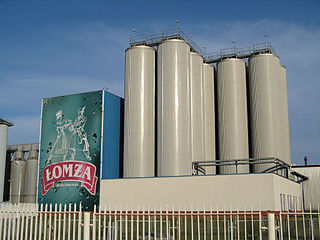
The Browar Łomża is Poland's fourth largest brewery. Browar Łomża Sp. z o.o. launched the plant in 1968. In 2007, it was purchased by Royal Unibrew. In 2011, it was sold to Polish Brewery Van Pur of Warsaw. The Browar Łomża brewery is located in Łomża, Poland.

The Cieszyn Brewery is a historic brewery in Poland and belongs to the Felix Investments. It is the longest continuously operating brewery in Poland. The brewery is located in the border town of Cieszyn, on the Castle Hill in the Classicist palace.

Lech Browary Wielkopolski is a big industrial brewery in Poznań, with a production capacity of 7.5 million hl. The plant is owned by Asahi Breweries subsidiary Kompania Piwowarska SA.
Dom Prasy was a Polish news corporation of the 1920s and 1930s, as well as a name of the eponymous building in Warsaw, where it had its headquarters. It published numerous daily newspapers and weekly journals. Taken over by the Germans during World War II, the company's assets became the cornerstone of the Nowy Kurier Warszawski propaganda newspaper. After the war the Dom Prasy's assets became the foundation of several modern newspapers, including Życie Warszawy.
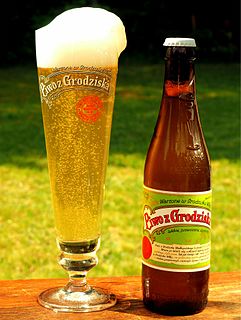
Grodziskie is a historical beer style from Poland made from oak-smoked wheat malt with a clear, light golden color, high carbonation, low alcohol content, low to moderate levels of hop bitterness, and a strong smoke flavor and aroma. The taste is light and crisp, with primary flavors coming from the smoked malt, the high mineral content of the water, and the strain of yeast used to ferment it. It was nicknamed "Polish Champagne" because of its high carbonation levels and valued as a high-quality beer for special occasions.
Browar Jędrzejów is a brewery in Jędrzejów, Poland. It is currently owned by Van Pur. It is well known for its Strzelec brand, which translates into Sagittarius.

Browar Koszalin is a brewery in Koszalin, Poland that is located in a Neo-Gothic building, built in the second half of the nineteenth century, that brews BROK beer. It belongs to the Van Pur brewery conglomerate.
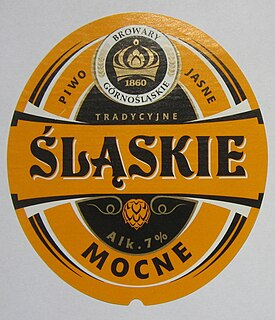
The Upper Silesia Brewery, also called Browary Górnośląskie w Zabrzu, is a brewery in Zabrze, Poland, owned by the Van Pur brewery conglomerate.
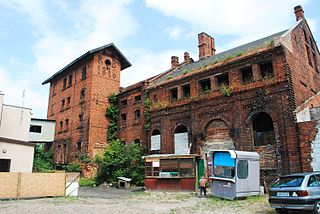
The Jerzy Bojańczyk's Brewery in Włocławek - an industrial site of the 19th-century historic Bojańczyk Brewery, built from 1832 to 1880 in Włocławek. Consists of 5 buildings: the main building of the Brewery, three warehouses and the Administrator's building.

Solec is a neighbourhood along the Vistula river in Warsaw, the capital of Poland. It is situated east of Frascati on the southeastern edge of Downtown and south of the Powiśle suburb. Solec was a self governing settlement and town from 1675 until its incorporation into Warsaw in 1791. The name "Solec" is derived from the Polish word for salt – sól – which was extensively traded and transported through the neighbourhood since the late Middle Ages. However, contemporary Solec is mostly occupied by residential tower blocks and commercial buildings.

















